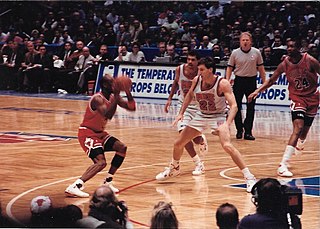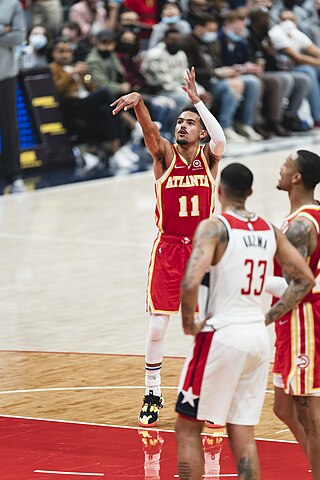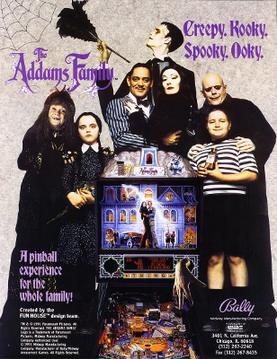
Basketball is a team sport in which two teams, most commonly of five players each, opposing one another on a rectangular court, compete with the primary objective of shooting a basketball through the defender's hoop, while preventing the opposing team from shooting through their own hoop. A field goal is worth two points, unless made from behind the three-point line, when it is worth three. After a foul, timed play stops and the player fouled or designated to shoot a technical foul is given one, two or three one-point free throws. The team with the most points at the end of the game wins, but if regulation play expires with the score tied, an additional period of play (overtime) is mandated.
Golf billiards is a pocket billiards game usually played for money. Unlike the majority of such games, it allows more than two people to play without compromises or rule changes. The game borrows from the outdoor game of golf, which is historically related to the cue sports. It is usually played on 10-foot or 12-foot snooker tables as their size and structure are more appropriate. In 2006 the Billiard Congress of America commented it was more popular than snooker in the United States.
Cutthroat or cut-throat, also sometimes referred to as three-man-screw, is a typically three-player or team pocket billiards game, played on a pool table, with a full standard set of pool balls ; the game cannot be played with three or more players with an unnumbered reds-and-yellows ball set, as used in blackball. Each player is commonly assigned a set of five consecutively numbered object balls, though the number of balls will vary by number of players. The object of the game is to be the last player with at least one ball of their group remaining on the table.
The penalty shootout is a method of determining a winner in sports matches that would have otherwise been drawn or tied. The rules for penalty shootouts vary between sports and even different competitions; however, the usual form is similar to penalty shots in that a single player takes one shot on goal from a specified spot, the only defender being the goalkeeper. If the result is still tied, the shootout usually continues on a "goal-for-goal" basis, with the teams taking shots alternately, and the one that scores a goal unmatched by the other team is declared the winner. This may continue until every player has taken a shot, after which players may take extra shots, until the tie is broken, and is also known as "sudden death".

Super Scope 6, known as Nintendo Scope 6 in Europe and Australia, is a shooter video game developed by Nintendo and Intelligent Systems and published by Nintendo for the Super Nintendo Entertainment System. The game was bundled with the Super Scope for the Super NES. As the name suggests, the cartridge contains six games that require the Super Scope to play.

In basketball, free throws or foul shots are unopposed attempts to score points by shooting from behind the free-throw line, a line situated at the end of the restricted area. Free throws are generally awarded after a foul on the shooter by the opposing team, analogous to penalty shots in other team sports. Free throws are also awarded in other situations, including technical fouls, and when the fouling team has entered the bonus/penalty situation. Also, depending on the situation, a player may be awarded between one and three free throws. Each successful free throw is worth one point.

Streetball is a variation of basketball, typically played on outdoor courts and featuring significantly less formal structure and enforcement of the game's rules. As such, its format is more conducive to allowing players to publicly showcase their own individual skills. Streetball may also refer to other urban sports played on asphalt. It is particularly popular and important in New York City and Los Angeles, though its popularity has spread across the United States due to the game's adaptability.
Twenty-one, also called play21basketball,cutthroat, hustle, tip-it, noyceball, roughhouse, scutter,rough, or rebound is a popular variation of street basketball. The game is played with any number of players on a half court, but typically when not enough players are available to at least play three-on-three. Twenty-one is an individual game that does not utilize team play.

Double Dribble is an arcade basketball video game developed and released by Konami in 1986. It was the second basketball arcade video game by Konami, following Super Basketball. It was considered the most realistic basketball sports video game upon release, with fast-paced action, detailed players, a large side-scrolling court, innovative cinematic slam dunks, and detailed sound effects, beginning a trend where presentation would play an increasingly important role in sports games.

The Addams Family is a pinball machine released in March 1992. It was designed by Pat Lawlor and Larry DeMar and released by Midway. It was based on the 1991 film of the same name, and features custom speech by the stars of the film, Anjelica Huston and Raul Julia. It is the best-selling solid state pinball machine of all time with 20,270 units sold.

This glossary of basketball terms is a list of definitions of terms used in the game of basketball. Like any other major sport, basketball features its own extensive vocabulary of unique words and phrases used by players, coaches, sports journalists, commentators, and fans.

Star Trek: The Next Generation is a widebody pinball game, designed by Steve Ritchie and released in November 1993 by Williams Electronics. It was part of WMS' SuperPin series, and was based on the TV series. It is the only pinball machine that features three separate highscore-lists. Apart from the regular highscore-list and the buy-in-list, it also features a reminiscence to The Machine: Bride of Pin*Bot billionaires club. It is also the third pinball game overall based on the Star Trek franchise, following the 1979 pinball game by Bally, and the 1991 game by Data East, and preceding the 2013 pinball game by Stern.
Variations of basketball are games or activities based on, or similar in origin to, the game of basketball, in which the player utilizes common basketball skills. Some are essentially identical to basketball, with only minor rules changes, while others are more distant and arguably not simple variations but distinct games. Other variations include children's games, contests or activities intended to help the player practice or reinforce skills, which may or may not have a competitive aspect. Most of the variations are played in informal settings, without the presence of referees or other officials and sometimes without strict adherence to official game rules.
Dynomite! is a PC game developed by Raptisoft Games and published by PopCap Games. Its gameplay is largely similar to that of the Puzzle Bobble series, but it has several unique differences.

Five-pin billiards or simply five-pins or 5-pins, is today usually a carom billiards form of cue sport, though sometimes still played on a pocket table. In addition to the customary three balls of most carom games, it makes use of a set of five upright pins (skittles) arranged in a "+" pattern at the center of the table. The game is popular especially in Italy and Argentina, but also in some other parts of Latin America and Europe, with international, televised professional tournaments. It is sometimes referred to as Italian five-pins or Italian billiards, or as simply italiana. A variant of the game, goriziana or nine-pins, adds additional skittles to the formation. A related pocket game, with larger pins, is played in Scandinavia and is referred to in English as Danish pin billiards, with a Swedish variant that has some rules more similar to the Italian game.

Jack-Bot is a 1995 pinball game which was designed by Barry Oursler and Larry DeMar, and released by Williams. It is the third game in the Pin-Bot series, following Pin-Bot (1986) and The Machine: Bride of Pin-Bot (1991).

Sinuca brasileira, often simply called sinuca, is a cue sport played on a snooker table, using only one red ball instead of snooker's fifteen, with the normal six colours of the standard set of snooker balls. Each ball carries the same basic point value as in snooker. As with other pocket billiards games, a white cue ball is used to pot the red and other coloured balls. The game is played almost exclusively in Brazil and is little known outside this region.

Who Dunnit is a Midway pinball machine with a 1940s style and a murder mystery theme. The playfield features up to five different murder mysteries in which the player must find clues and evidence by making indicated shots. The machine accepts up to four players, and features four-ball play.
Basketball is a ball game and team sport in which two teams of five players try to score points by throwing or "shooting" a ball through the top of a basketball hoop while following a set of rules. Since being developed by James Naismith as a non-contact game that almost anyone can play, basketball has undergone many different rule variations, eventually evolving into the NBA-style game known today. Basketball is one of the most popular and widely viewed sports in the world.

Big3 is a 3-on-3 basketball league founded by hip-hop musician and actor Ice Cube and entertainment executive Jeff Kwatinetz. The league consists of 12 teams whose rosters include both former NBA players and international players. The rules of Big3 games contain deviations from the official rules of 3-on-3 basketball as administered by FIBA. In January 2020, Big3 announced its rule set would be the core of a new basketball variant called "Fireball3".












